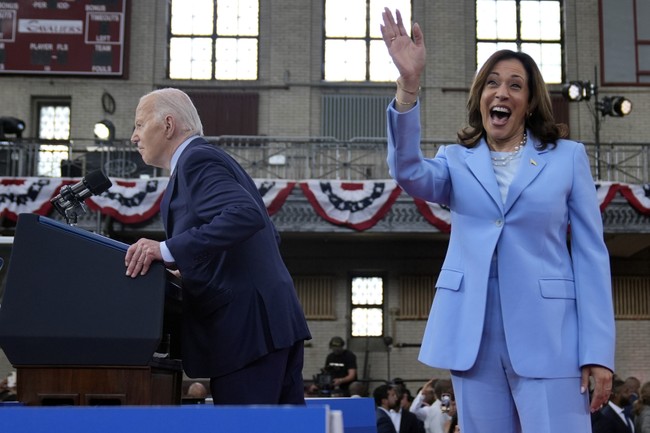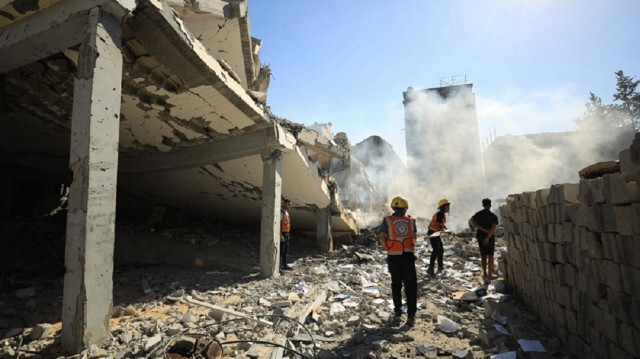Historic Palestinian Unity Deal Signed in Beijing
Amid ongoing conflict, a significant agreement between Hamas, Fatah, and other factions in Beijing aims to create a unified Palestinian governing body.
Published July 24, 2024 - 00:07am

Image recovered from washingtonexaminer.com
Senior representatives of more than a dozen Palestinian factions, including Hamas and Fatah, signed a unity agreement in Beijing on Tuesday to form a government together. This momentous accord, facilitated by China, marks a significant step towards Palestinian national unity amidst turbulent times.
The rivalry between Hamas, which has controlled Gaza since 2007, and Fatah, the dominant force in the U.S.-backed Palestinian Authority governing parts of the West Bank, has been a long-standing barrier to peace and governance. Previous reconciliation efforts have failed, casting doubt on the potential success of this new initiative. Nonetheless, the recent war in Gaza has intensified the urgency for a unified Palestinian front.
Chinese Foreign Ministry spokeswoman Mao Ning highlighted the declaration's aim to end division and strengthen Palestinian national unity. Chinese Foreign Minister Wang Yi emphasized that the PLO (Palestine Liberation Organization) remains the sole legitimate representative of all Palestinian people. The agreement outlines plans for a provisional national reconciliation government aimed at post-Gaza war governance, yet few specific details were disclosed at the time of the announcement.
The accord, signed with the involvement of other Palestinian factions, stipulates the creation of a temporary national unity government to exercise authority over all Palestinian territories occupied by Israel in 1967. These territories include the Gaza Strip, the West Bank, and East Jerusalem, which are central to Palestinian aspirations for statehood.
A spokesperson for UN Secretary-General Antonio Guterres welcomed the accord, stating that steps towards unity are both welcome and critical. Guterres sees Palestinian unity as crucial for peace and security, as well as for advancing the Palestinian people's self-determination and sovereignty.
Despite the historic nature of the agreement, experts remain cautious. Jonathan Fulton, a senior fellow with the Atlantic Council, expressed skepticism about the agreement's potential to result in meaningful change, citing the numerous previous unification attempts that have failed. He also noted that China's involvement might complicate matters, given Beijing's strained relations with Israel following the recent escalations.
Israeli leaders have swiftly condemned the deal. Israeli Foreign Minister Israel Katz declared that joint governance of Gaza by Hamas and Fatah would not materialize, reiterating that Hamas' rule would be obliterated. Israel has consistently refused to accept any Palestinian government that includes Hamas unless it recognizes Israel, a stance that has stymied past unity attempts.
Hamas' spokesperson Mousa Abu Marzouk and Fatah's deputy chief, Mahmoud al-Aloul, were critical figures in the Beijing negotiations. The agreement's success hinges on its implementation, a point underscored by independent Palestinian National Initiative founder Mustafa Barghouti. Egypt and Algeria will oversee the implementation process.
International reactions have been mixed. The United States and several Western countries support Israel's stance that Hamas is a terrorist organization, and thus should not play a role in Gaza's governance. Conversely, there is strong international backing for a unified Palestinian governing body that can manage both Gaza and the West Bank.
The geopolitical dynamics of this agreement are complex. While the deal represents a significant diplomatic achievement for China, which has been steadily increasing its influence in Middle Eastern affairs, there are still numerous challenges ahead. The unity deal is further complicated by the varying levels of support for Hamas and Fatah within the Palestinian population, as well as the broader geopolitical landscape.
According to a poll conducted by the Palestinian Centre for Policy and Research in Ramallah, popular support for the reconciliation and unification of Hamas-ruled Gaza with Palestinian Authority-administered enclaves in the West Bank has increased. However, the internal divisions and competing agendas within Palestinian society pose significant obstacles to the practical implementation of the unity government.
Palestinian President Mahmoud Abbas' Fatah remains reluctant to share power with Hamas, which won the Palestinian legislative election in 2006. The current war in Gaza has heightened the urgency of these governance issues, with Hamas expressing a desire to form a government of technocrats to prepare for elections in both Gaza and the West Bank.
Ultimately, the agreement signed in Beijing may represent an important initial step towards Palestinian unity, but its success will depend heavily on the commitment of all parties involved to implement the accord effectively. The path to a unified Palestinian governance structure is fraught with challenges, yet the international community remains hopeful that this historic agreement could pave the way for a more stable and peaceful future in the region.






